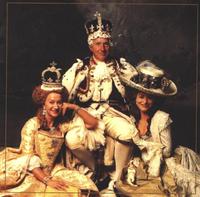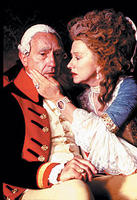Hamburgers, Ice Cream, Cookies
 Sir Nigel Hawthorn, 1929-2001
Sir Nigel Hawthorn, 1929-2001From an obituary:
"IN 1990, I SAT IN BROADWAY'S Brooks Atkinson Theatre and watched a 61-year-old British actor whom I had never before seen perform the hell out of the lead role of C.S. Lewis (author of the Narnia books) in William Nicholson's Shadowlands. A confirmed British bachelor, Lewis finally found true love with a younger American divorcee, only to have her die before her time. Toward the end, Hawthorne had a monologue that transformed seamlessly into a pained declaration of raw grief. It was a masterful display of profound sadness and controlled rage. Later, the openly-but-quietly gay Hawthorne shared that it had been fueled by his own prolonged nightly vigil at the deathbed of a dear friend dying from AIDS.
Despite a Tony Award for the role, Richard Attenborough cast the more bankable Anthony Hopkins in his 1993 film version. Though I kept waiting to compare the two men in the climactic speech, it never came. A casualty of the screen translation. All te better for now it belongs to Hawthorne and to those who were lucky enough to bear witness.
Nigel Hawthorne was a steadily working actor for 40 years' before Shadowlands. He had a significant British stage resume and achieved popular success starring in the hit British comedy series, Yes, Minister, and its follow-up, Yes, Prime Minister, both of which played to PBS audiences in the States. But it wasn't until Alan Bennett insisted that Hawthorne recreate his stage triumph in the title role of the 1995 film adaptation of his play, The Madness of King George that Hawthorne truly became known on the international scene. In the U.S., his royally insane portrayal brought him a Best Actor Oscar nomination, the first for an openly gay actor." LINK
 George III
George III"In 1810, George became dangerously ill, the malady possibly having been triggered by the death of the King's youngest and favourite daughter, the Princess Amelia, from erysipelas or porphyria. By 1811, George III had become permanently insane and locked away at Windsor Castle until his death. Sometimes speaking many hours without pause, he claimed to talk to angels and once greeted an oak tree as King Frederick William III of Prussia. His doctors gave him James's Powder (calomel and tartar emetic) and bled him regularly. They also advised him to bathe in the sea (thus encouraging public seaside vacations).
Parliament then passed the Regency Act 1811, to which the Royal Assent was granted by the Lords Commissioners (who were appointed under the same irregular procedure as was adopted in 1788). The Prince of Wales acted as Regent for the remainder of George III's life.
Spencer Perceval was assassinated in 1812 (he was the only British Prime Minister to have ever suffered such a fate) and was replaced by Robert Banks Jenkinson, 2nd Earl of Liverpool. Lord Liverpool oversaw British victory in the Napoleonic Wars. The subsequent Congress of Vienna led to significant territorial gains for Hanover, which was upgraded from an electorate to a kingdom.
Meanwhile, George III's health deteriorated. Over the Christmas of 1819, George suffered a further bout of madness and spoke nonsense for fifty-eight hours, then sank into a coma. On 29 January 1820, George died blind, deaf, and insane at Windsor Castle. By the time of his death, George III had lived for over eighty years and reigned for almost sixty years—in each case, more than any other English or British monarch until that point. Neither record has been surpassed by any monarch since, with the exception of Victoria. George III was buried on 16 February in St. George's Chapel, Windsor.
George was followed by his eldest son (who became George IV). Next came another of George III's sons, who became William IV. William IV, too, died without children, leaving the throne to his niece, Victoria, the last monarch of the House of Hanover." Via Wikipedia
 Alan Bennett
Alan Bennett"Alan Bennett has been a household name in British theatre ever since he starred and co-authored the satirical review Beyond the Fringe with Dudley Moore, Peter Cooke and Jonathan Miller in 1960 at the Edinburgh Festival. Later the same show played to packed houses in London's West End and in New York. Although Bennett started by writing and acting for the stage, he very soon turned his attention to writing plays for television.
Bennett's career, though less spectacular than those of his Fringe companions, has displayed greater diversity and more solid achievement. To many he is now regarded as perhaps the premier English dramatist of his generation. This is all the more surprising given the low-key themes and understated expression of the "ordinary people" who populate his dramatic world. Like the poetry of Philip Larkin, another Northerner whose writings he admires, his writing frequently focuses on the everyday and the mundane: sea-side holidays, lower-middle class pretensions, obsessions with class, cleanliness, propriety and sexual repression." LINK

"The Madness of King George spreads its story on a broad canvas: the court of a troubled King who is seized by what seems to be dementia. As George III (Hawthorne) loses control, the foppish Prince of Wales (Rupert Everett) plots to seize the throne, while Prime Minister William Pitt (Julian Wadham) fights to retain his power. But at its heart King George is an intimate family drama. It can be seen as satirical parable - "The film is really as much about the royal family today as it is about the 18th century," says Bennett - or as domestic tragedy, a kind of Mr. and Mrs. King Lear. Father is slipping away; what are Mother (Mirren) and the children to do?George could also be a failed Alan Bennett. "My films are about embarrassment," he says. "George III, for one, is nervous and shy, like many royals. His bluntness and heartiness proceed from social unease. But his role is to present himself as King. When madness sets in, he drops this facade; he isn't embarrassed anymore. Embarrassment is a continuing theme in my work. I can't say I'm George III, but I certainly understand him!" Alan Bennett Interview


2 comments:
Well as a sucker for a happy ending, I'm pleased that the movie took such liberties!
btw, very fast posting, Peter, are you stalling?
btw, there was a recent article (possibly Newsweek this week 8/1), that indicated they recently tested tissue/hair from King George and have determined that he may not have had porphyria, or that his problems were not cause by porphyria. Apparently, he suffered from arsenic poisoning -- which would account for virtually all of his symptoms. However, they don't believe it was murder, apparently a small doses of arsenic were used to treat his condition and it gradually made him worse and killed him.
Post a Comment